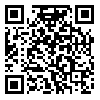Volume 2, Issue 8 (9-2019)
2019, 2(8): 45-71 |
Back to browse issues page
Download citation:
BibTeX | RIS | EndNote | Medlars | ProCite | Reference Manager | RefWorks
Send citation to:



BibTeX | RIS | EndNote | Medlars | ProCite | Reference Manager | RefWorks
Send citation to:
jafariniya S. Ranking Effective Bases on Performance of Human Resource Planning Systems (Correlation and Fuzzy Approach). Journal title 2019; 2 (8) :45-71
URL: http://jde.khu.ac.ir/article-1-100-en.html
URL: http://jde.khu.ac.ir/article-1-100-en.html
Abstract: (1774 Views)
EnThe present research studied the relationship between organizational learning elements and human resources performance. Population of the research consisted of all managers Tehran Telecommunication Company. Data were collected through questionnaires which included 24 questions with seven items. To determine the impact and ranking theprinciples of organizational learning in performance of human resources, Technique for Order Performance by Similarity to Ideal Solution or fuzzy TOPSIS was applied. The relationship between variables was measured using correlation coefficient and it was specified that there is a positive and significant relationship between individual skills, mental models, common perspective, team learning and system thinking and organizational productivity of managers of Tehran Telecommunication Company. Five main factors were analyzed in the research, including individual skills, mental models, common perspective, team learning, and systematic thinking. From managers' point of view in the research, individual skills have the greatest and common perspective has the least impact on human resources performance in organization.
ter your news text here
ter your news text here
Keywords: organizational learning, human resources performance, individual skills, and mental models
Type of Study: Research |
Subject:
Special
Received: 2018/11/17 | Accepted: 2018/12/31 | Published: 2019/09/14
Received: 2018/11/17 | Accepted: 2018/12/31 | Published: 2019/09/14
References
1. Babnik et al.(2014). Individuals learning in work teams: Support to knowledge management initiatives and an important source of organizational learning. Social and Behavioral Sciences. No. 124, pp. 178 - 185. [DOI:10.1016/j.sbspro.2014.02.475]
2. Bennis, W. & et al (1985), The Planning of Change, Newyork: Holt, Rinehart and Winston.
3. Brown, J.S. & Duguid, P. (2013), Organizational Learning and Communities-of practice: Toward a unified view of working, learning, and innovation, Organization Science.
4. Carre P.& Pearn M.(2015), L'Autoformation dans L'Eeterprise,Paris:Editions Entente.
5. Daft, Richard L. (1998), Essentials of Organizational Theory and Design , Cincinnati:South-Western College Publishing.
6. Daft, R.& Lengel, R.H. (2012), Organizational Information Requirmenets, Media Riches, and Structual Design, Organization Science.
7. Dodgson,M (2011), Organizational Learning: A Review of Some Literatares. Organizatin Studies, Vol 14, No 3. [DOI:10.1177/017084069301400303]
8. Foil, c & et al (2011), Organizational Learning, Academy of Management Review, Vol 10,No 4. [DOI:10.2307/258048]
9. Friedman, T.L. (2013), The Lexus and The Olive Tree, Newyork:Anchor books.
10. Gadamer, H (1979), Truth and Method, London: Sheed and Ward.
11. Garvin, David(1993), Building a Learning Organization, Harvard Business Review, Aug.
12. Garvin, David(2000), Learning in Action, Harward Business School Press, http"//www2.darwiongmag.com.
13. Gershman, A. & Gottsman, E.(2002), Hypermedia for Corporate Knowledge Dissemination, Proceedings of the Twenty-Sixth Hawaii International Conference on System Science '93, CA;IEEE Press.
14. Grantham, C.E. & Nichols, L.D. (2010), The Digital Workplace: Designing Groupware Platforms, New york: Van Nostrand Reinhold.
15. Habermas,J (1984), The Theory of Communicative Action, volum 1, Cambridge: Policy Press.
16. Hiltz, S.R & Turoff, M. (2005), The Network Nation: Human Communication via Computer, MA: MIT Press.
17. Huber, G.P. (1991), Organizational Learning: The contributing processes and the literatures, Organization Science. [DOI:10.1287/orsc.2.1.88]
18. Isakowitz, T. (2009), Hypermedia, Information Systems, and Organizations: A research agenda, Proceedings of the Twenty-Sixth, Hawaii International Conference on System Science '93, CA; IEEE Press.
19. Jaafari et al.(2012).The relationship among organizational climate, organizational Learning and teacher's self efficacy. Social and Behavioral Sciences. No. 47. pp 2212 - 2218. [DOI:10.1016/j.sbspro.2012.06.974]
| Rights and permissions | |
 | This work is licensed under a Creative Commons Attribution-NonCommercial 4.0 International License. |




